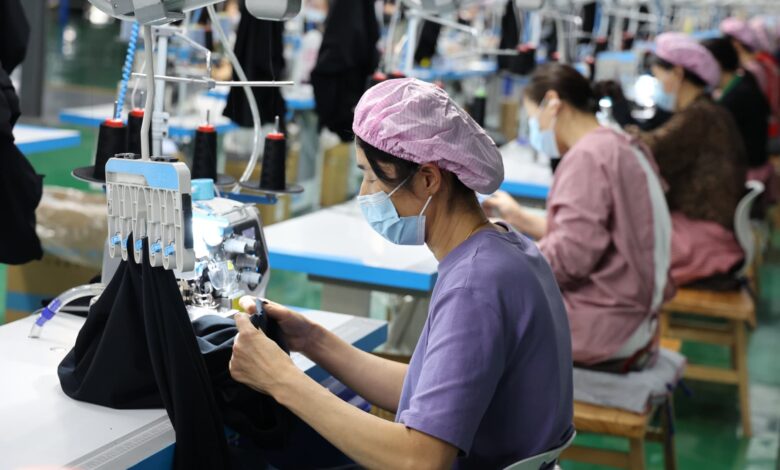Chinese factories stop production, eye new markets as U.S. tariffs hit

The impact of U.S. tariffs on Chinese manufacturers is becoming increasingly apparent, as factories are pausing production and workers are facing furloughs. The recent doubling of tariffs has had a significant effect on businesses that rely on exports to the U.S. Many small businesses are finding it challenging to cope with the sudden increase in tariffs, with some facing the possibility of going out of business.
In response to the trade disruptions, Chinese exporters are exploring new sales strategies to mitigate their losses. Livestreaming has emerged as a popular way for businesses to reach customers in China, with companies like Woodswool turning to online sales channels to sell their products domestically. Major Chinese tech companies, such as Baidu, are offering subsidies and tools to help exporters redirect their goods to the domestic market through livestreaming e-commerce platforms.
While the domestic market presents new opportunities for Chinese exporters, there are challenges to overcome. E-commerce companies like JD.com and Meituan are stepping in to support exporters, but the $27.22 billion pledged is only a fraction of China’s total exports to the U.S. Manufacturers are also facing competition from local Chinese businesses, as they pivot towards selling domestically.
In light of the challenges posed by U.S. tariffs, Chinese companies are exploring alternative markets outside the U.S. Some are diversifying production to countries like India and Southeast Asia, while others are turning to Europe and Latin America. Companies like Beijing Mingyuchu are already doing business in countries like Brazil, where trade with China has been steadily increasing.
Overall, Chinese manufacturers are adapting to the changing trade landscape by exploring new markets and sales strategies. While the impact of U.S. tariffs is significant, businesses are finding ways to navigate the challenges and identify new opportunities for growth. Cotrie, a company that specializes in trade between China and Ghana, has seen significant growth in recent years. According to the company’s spokesperson, they now make between $300,000 to $1 million annually. This success can be attributed to the increasing demand for goods and services between the two countries.
The ongoing trade tensions between the United States and China have also played a role in Cotrie’s growth. Many companies are looking to diversify their sourcing and manufacturing locations outside of the United States, and Ghana has emerged as a promising alternative. This shift in focus has opened up new opportunities for Cotrie to expand its business and increase its revenue.
Cotrie’s success is a testament to the potential for cross-border trade between China and Ghana. As the global economy continues to evolve, companies like Cotrie are well-positioned to capitalize on the growing demand for goods and services in emerging markets. By leveraging their expertise in trade and fostering strong relationships with partners in both countries, Cotrie is poised for continued success in the years to come.
For more insights and analysis on trade and business opportunities in Asia, subscribe to our weekly newsletter. Stay informed about the latest developments in Asia’s largest economy and receive valuable insights straight to your inbox. Subscribe now to stay ahead of the curve and make informed decisions for your business.





